The New Atlanticism

Where Americans and Western Europeans Agree and Disagree
About Democracy, Wars in Ukraine and Gaza, China, and European Security
By Mark Hannah, Lucas Robinson, Olivia Chilkoti
June 2024
View past reports for more on this topic: 2019 | 2020 | 2021 | 2022 | 2023
Executive Summary
The Institute for Global Affairs (IGA) at the Eurasia Group asked 3,360 people in nationally representative samples of the United States, United Kingdom, Germany, and France — four politically, economically, culturally, and militarily intertwined countries — their perspectives on national security threats, geopolitical challenges, and democratic principles. Our findings reveal transatlantic views which align and diverge in interesting, and potentially consequential, ways.
On the wars in Ukraine and Gaza, Americans and Western Europeans agree — but also disagree — in important ways.
- There is broad transatlantic support for urging a negotiated settlement to end the war in Ukraine. In both the US and Western Europe, respondents selected reasons to support NATO countries pushing for a negotiated settlement more than twice as often as reasons to oppose exerting this influence. The loss of life and casualties associated with the war was the most often selected reason. European respondents were more likely to worry about the West’s industrial capacity and American respondents expressed more concern about Ukraine losing leverage.
- Americans and Western Europeans want their countries to avoid escalation and prevent further Ukrainian suffering significantly more than they want to restore Ukraine’s borders or deter autocratic countries. The Europeans surveyed were much more concerned than Americans about spillover into a regional war.
- Though more Americans than Western Europeans think the West must support Israel’s defense or that Israel must destroy Hamas to be secure, these views are held by a minority in the US (28% and 33%, respectively). A slight majority of European respondents — and 42% of Americans — believe Israel should agree to a lasting ceasefire.
Respondents in all four countries want Europe to take primary responsibility for its own security.
- Majorities in all four countries surveyed think Europe should be “primarily responsible for its own defense while aiming to preserve the NATO alliance.” Western Europeans are half as likely as Americans to think “the US should be primarily responsible” for defending Europe.
- Nearly three times as many Western Europeans want a “neutral relationship” with the US as want the US to be their primary defender. This view was most popular in France — whose president advocates for “strategic autonomy” — with nearly a third of French subscribing to it.
- Only 6% of Western Europeans see the US as a “very reliable” guarantor of European security over the next decade. Americans are about four times as likely as Western Europeans to see the US as a very reliable guarantor.
- Two and a half times as many Western Europeans — and four times as many Americans — want the US to decrease or withdraw its troops from Europe as want it to increase its troop presence. Still, a plurality in all countries prefer the status quo.
Americans and Western Europeans perceive different threats, and disagree on how to respond to China’s rise.
- Asked to choose the “biggest challenges facing your country today” from a list of nine, the most frequent answer for the US and UK was “political elites making decisions that hurt the public.” Western Europeans were significantly more likely than Americans to choose “immigration changing my country’s national identity.”
- A majority of Americans supported — while Europeans were more likely to oppose — preparing for a new Cold War with China, when presented with reasons for and against the idea. Americans were three times as likely as European respondents to cite a perception that China threatens their country’s security as a reason to support such preparations.
- Americans are much more likely than Western Europeans to hold a “very unfavorable” view of China. Though more than two-thirds of people in all four countries surveyed hold an unfavorable view of China.
Younger and older generations disagree on geopolitical challenges and how to address them.
- Younger people differ from older people in their perceptions of democracy which may reflect a cohort effect for those who came of age in the post-Cold War era. Only one in three adults under the age of 45 think it is “definitely” the best form of government (compared to half of respondents 45 and older).
- Twice as many adults 65 and older as adults under 30 think the West must support Israel or that Israel must destroy Hamas in order to be safe.
- Younger adults are more likely to view China favorably and less likely to think their country should prepare for a “new Cold War.”
- Older adults are more concerned about the effects of immigration, populism, and political elites –– adults under 30 are twice as likely to worry about economic policies.
Several findings have implications for the 2024 presidential campaign in the United States.
- Two in five Americans say their political views don’t neatly align with any one party. More than a third think the party they oppose “threatens my country’s well-being.” More Americans than Western Europeans are concerned about social media making the country more polarized.
- When asked to select which leader from a slate of world leaders displays the most positive example of leadership, about half of Americans select President Biden (a significantly greater share than other surveyed countries’ ratings of their own leaders). There is a large partisan divide in the United States. About two-thirds of Democrats pick Biden. A greater share of Republicans selects Israeli prime minister Benjamin Netanyahu than Biden.
- Americans are more likely than Western Europeans to say immigration has most affected their country’s economy. Western Europeans are more likely to say it has affected their countries’ security. Americans are evenly divided on whether immigration has had a positive or negative economic impact, and about two in five think it’s had a negative effect on national security. They are 70% more likely to see immigration as a positive than negative influence on American culture.
- Only one in four voting-age Americans think the United States has responded well to the war between Israel and Hamas. Democrats are more than twice as likely as Republicans to think the US shares responsibility for the plight of Palestinians in Gaza, and more than three times as likely as Republicans to think Israel’s conduct resembles war crimes.
- More than one-in-four Americans registered the peaceful transition of power among the most important elements of democracy — more than in any other country surveyed. Democrats were more than twice as likely as Republicans to cite it.
Introduction
This year is not just an election year in the United States, it’s an historic election year worldwide. Sixty-four countries, representing roughly half of the world’s population, are holding national elections — more than during any other year in history.1 In the United States, the future of American support for the ongoing wars in Ukraine and Gaza, the prospect of a trade war with China, immigration policies, and the embrace or rejection of populist politics are on the ballot.
Some argue the stakes couldn’t be higher.2 This year’s elections come as democracy suffers a crisis of confidence. Democratic institutions, norms, and practices are in disarray the world over. Reports and studies warn freedom is in retreat and public trust in government is on the ropes.3 Even the democratic examples set by the United States and Western Europe display some blemishes.
We fielded our first international survey in 2019. What began as a survey of eight geographically and politically diverse countries has taken on a regional focus. Last spring, we examined views of US-China competition in three Asian countries. This year we turn to the Atlantic to compare views of democracy, current wars, and international challenges in the United States and three Western European countries — the United Kingdom, Germany, and France.
The transatlantic relationship — a catch-all phrase to describe the many ties between the United States and Western Europe — is often conceived as essential to a rules-based international order.4 The United States and Western Europe uphold themselves as beacons of liberal democracy. Their cultural, political, and economic influence has broad appeal. And their prosperity and freedom exerts tremendous pull on immigrants and refugees who seek a better future.
In Western Europe, the United Kingdom, Germany, and France perhaps most exemplify these traits — they are the region’s three most populous and wealthy nations. One must be cautious of painting Western Europe with too broad a brush. The three countries we surveyed were selected for their geopolitical influence and geostrategic importance to the US, but are not especially representative of Europe — or even Western Europe — as a whole. So references to “Western Europe” throughout this report are intended as shorthand to these three countries, and any interpretation of our results should mind this caveat.
Still, the United Kingdom, Germany, and France are good points of entry to begin to understand transatlantic attitudes. Throughout their intertwined histories, these countries dominated the European continent. Their rivalries drove the formation of alliances and caused destructive wars. Yet it wasn’t all power politics. Their connections with one another facilitated the spread of liberal ideals — such as tolerance, popular sovereignty, and individual rights — even if Western Europe, with its troubled history of imperialism, was slow to realize these ideals.
The United Kingdom’s democracy has medieval roots, but it developed incrementally as the power of the royal family diminished and parliament ascended. The French Revolution — inspired in part by the American Revolution and dismissed by the British for its violence — left an indelible mark on French political culture that carries on into today’s Fifth Republic.5 Germany’s democracy eventually solidified when West and East Germany reunited at the end of the Cold War.
Europe today is a testament to the transatlantic bonds forged during World War II and in the early Cold War. The United States remained in Europe with the Nazi’s defeat. With the Marshall Plan, it helped rebuild war-torn Germany and much of Western Europe. The United States also took the lead in the newly formed North Atlantic Treaty Organization (NATO) to protect Western Europe from a new powerful adversary, the Soviet Union.
The United States and much of Western Europe remain close allies. This year, the NATO alliance celebrates its 75th anniversary and welcomes its 32nd member, Sweden, to the pact. Russia’s invasion of Ukraine reinvigorated the alliance in certain ways. NATO demonstrates its resolve to support Ukraine for “as long as it takes” and its members’ aid has steadily expanded.6 Some NATO leaders, confident in the alliance’s unity of purpose, have gone so far as to call for the deployment of NATO troops to Ukraine.7
Vladimir Putin is “the greatest salesman in NATO’s history,” Admiral James Stavridis, the former supreme allied commander of NATO, told IGA’s None Of The Above podcast.8 Countries such as Germany, which have long shirked their defense obligations to NATO, vowed to increase military spending.9 Finland and Sweden ditched their traditions of nonalignment to join the alliance.
If NATO’s birthday was cause for the alliance to celebrate, it might find itself a bit hungover by this July’s NATO summit. Ukraine is on the defensive — its military dogged by shortages in materiél and manpower.10 NATO officials offer Ukraine a “bridge” to join the alliance, but the prospect of a long war and ongoing issues with political corruption make membership for the embattled nation unlikely in the near future.11
Transatlantic relations are also tested farther afield. China’s military and economic power, as well as its burgeoning partnership with Russia, elicit calls in the West to expand NATO’s coverage to the Pacific — despite little consensus within Europe on how best to approach China.12 Then there is the Middle East. Israel’s war in Gaza and the unfolding humanitarian crisis stoke divisions among Western nations, lawmakers and citizens.

The site for this year’s NATO Summit, Washington DC, is a symbolic choice. It’s where the treaty establishing the alliance was signed, and it’s where the alliance will perhaps be most put to the test. The prospect of another four years with Donald Trump as president raises concerns in European capitals about whether the United States is a reliable guarantor of their security. Many fear the United States might even pull out of the alliance.13
These challenges and others — from ethnonationalism and discontent with immigration to climate change and economic crisis — will test the strength of America’s relations with Europe. In a period of uncertainty, we hope this survey provides clarity on the topics which drive agreement among — and disagreement between — Americans, Brits, Germans, and French.
Specific Findings
Transatlantic Views of Democracy | War in Gaza | European Security | China | International Challenges
Transatlantic Views of Democracy
The politics of the United States and Western Europe are alike in many ways. Though the four countries we surveyed are liberal democracies rooted in Enlightenment era ideas, their political systems and their publics — as this report reveals — prioritize different aspects of democracy and perceive different challenges to it. Together these countries are often viewed as among the standard-bearers of a rules-based international order.
In recent years, however, that order has reportedly entered a state of decline. The United Kingdom left the European Union, the United States has faced challenges to the rule of law and political violence, and support for far-right parties in France and Germany has surged.14 None of these countries have been immune to the spread of populism, deepening polarization, and the rise of ethnonationalism.
Compared to the optimism that followed its Cold War victory, the West seems less confident in the universal appeal and effectiveness of liberalism and democracy.15 Washington tends to blame powerful adversaries, though many of the causes of this crisis come from within — and interact with foreign policy in ways beyond the challenges posed by illiberal countries like Russia and China.16 This section compares views from across the Atlantic on perceptions of democracy, national challenges, and security threats.
Most Americans and Brits think harmful decisions by political elites are among the biggest challenges facing their country. Immigration topped the list of concerns in Germany and France.
Skepticism towards elites and their expertise is a defining characteristic of populism — and is associated with far-right political movements.17 But trust in government is in decline, with a variety of reasons often cited, such as: excessive government secrecy, a lack of accountability among foreign policy officials, and unresponsive lawmakers.18
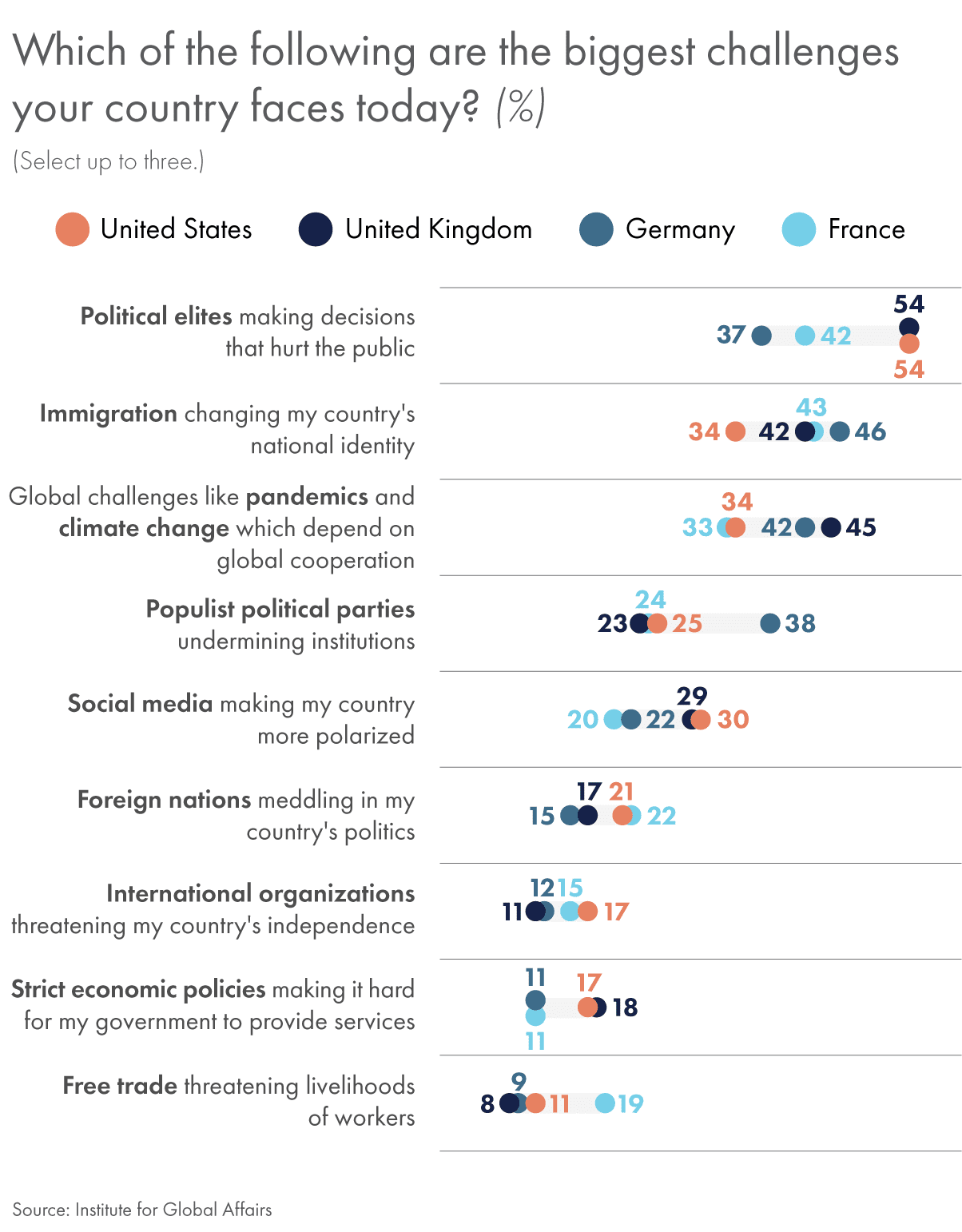
Most people in the United States and the United Kingdom, and more than a third in Germany and France, think harmful decisions by political elites are among the biggest challenges their country faces. Populism itself and its erosion of institutions is less frequently selected by survey takers — but it is still seen to be a major challenge by about a quarter of people in the United Kingdom, France, and the United States, and by more than a third of Germans. The politically divisive effects of social media are also viewed to be a major challenge by nearly a third of Americans and Brits.
Transnational issues like immigration, pandemics, and climate change are politically contentious issues in the United States. Recent surveys find them to be increasingly polarizing topics in Europe.19 In Germany, France, and the United Kingdom, more than four in ten survey takers think immigration’s effect on their country’s national identity is among the biggest challenges. Roughly a third of Americans think it is. More people in the United Kingdom and Germany than in the United States and France think global challenges such as pandemics and climate change are among the biggest threats.
Globalization has placed these transnational issues front and center, giving rise to a range of critiques and inflamed policy debates. Immigration is one such issue. Right- and left-wing critics highlight the negative effects of free trade on their country’s workers. In a similar vein, some charge international institutions with undermining their nation’s sovereignty. Others emphasize the role of economic policies for the contraction of social services. But these are lesser concerns for survey takers. Fewer than 20% in each country include international organizations, strict economic policies, and free trade among their greatest concerns.
Older adults are much more concerned than younger adults about the effects of immigration and populism and political elites — twice as many adults under 30 worry about economic policies than those 45 and older.
Austerity is a greater concern among young people. Across all four countries, twice as many in the youngest than oldest age group cite the effects of strict economic policies on social services as a major challenge. This difference is largest in the United States.
Overall, younger and older people share similar outlooks towards elites and global threats like climate change. Young people who grew up with social media and older people who didn’t similarly worry about its polarizing effects. It is a top concern for approximately one in four people in each age group across all four countries.
Generational differences are seen in the prioritization of other challenges. Concern with the negative effects of immigration on national identity is greatest among the oldest age group. Twice as many think immigration is among the greatest challenges compared to Gen Z. Nearly one in three people in the oldest group see populism as a major danger.

In the US, most adults under 30 view global challenges like pandemics and climate change the biggest threats facing their country. Most Americans 45 and older view the biggest threat to be the harmful decisions of political elites.
Within the United States, many public policy areas are susceptible to anti-elite backlash, but few areas are as elite-driven as foreign policy. There is rich debate on the extent to which public opinion informs foreign policy — and whether it should.20 In any case, prior surveys fielded by IGA in the United States reveal that, on many issues, there is a large gap between the priorities of Americans and the policies enacted in Washington.21 Within the youngest group of respondents, the challenge of elite decision-making ranked second only to global challenges like pandemics and climate change. It was the top concern among every other age group.

There are notable generational divides on challenges which straddle domestic policy and international affairs. Americans over the age of 64 are roughly twice as likely as the youngest to be concerned with immigration, populism, and foreign countries meddling in US elections. Young Americans, like their peers in Western Europe, came of age in an era marked by financial crisis, a major global pandemic, and tremendous uncertainty. Combined with the pervasiveness of student loan debt, and a treacherous post-pandemic job market, the threat of unemployment and economic recession looms large psychologically, if not in actuality. Millennials and Generation Z struggle to achieve financial independence. For instance, Gen Z is the most burdened by increasing costs of living and worries more than any other generation about their financial situation.22 Nearly a third of Americans under the age of 30 view strict economic policies among the biggest challenges.
Equality under the law and individual freedoms are widely seen as among
the most important components of democracy. Americans prioritize individual freedom and peaceful transitions of power more than Western Europeans.
The four countries we surveyed are home to democratic institutions which promote liberal political and economic principles such as the rule of law, free markets, and the consent of the governed. Yet, for a variety of historical, political, economic, cultural, and religious reasons, the democracies in the United States and Western Europe emphasize different values. American political culture is commonly perceived to be rooted in individualism, whereas Western Europe emerged from the trauma of World War II to develop robust welfare systems.
When asked to pick the three components of democracy they find the most important, respondents selected equality before the law most frequently. Individual freedoms and civil liberties were most frequently selected in the United States, but prized by significant swaths of people in the three European countries surveyed.

Views on the importance of citizens freely voting and running for office differ by country. Since 2020, concerns with election integrity have culminated in a spate of polarizing voter ID laws in the United Kingdom and in various states in the US.23 In both countries, these laws face vocal backlash for disenfranchising groups of voters. Yet fewer than half of American and British respondents — but a majority of Germans and French — think freely voting and running for office is among the most important components of democracy.
Germans are most likely to select judicial independence and freedom of the press. Despite the value Americans place on individual freedom (64%), only 16% of adults in the United States select freedom of the press. In the United States, where the violent takeover of the Capitol building on January 6, 2021 continues to feature prominently in the 2024 presidential campaign, more than one in four people registered the peaceful transition of power among the most important elements of democracy — more than in any other country. Democrats are about twice as likely to say this than are Republicans (42% vs. 20%, respectively).
And, perhaps reflective of their distrust towards elites, more Brits and Americans than French or Germans prioritized the democratic principle that elected representatives be responsive to their voters’ concerns.
Respondents under 45 are less certain in their support for democracy than those 45 and older.
Recent polls show high levels of dissatisfaction with the state of democracy in the US and Europe. Many report their governments to be slow, unresponsive, and out of touch.24 Citizens might wish their governments worked better, but our survey findings suggest most people don’t see a preferable alternative.
With varying degrees of confidence, most people think democracy is the best form of government. Germans express the most confidence: more than 80% think it’s probably (32%) or definitely (50%) best. In the United States and United Kingdom, 77% of people agree. Of Americans, 29% responded “yes, probably” and 48% selected “yes, definitely.” Thirty-eight percent of Brits say probably and 39% say definitely. In France, 72% think it probably (38%) or definitely (34%) is best.
Some aren’t sure. Fourteen percent in the United States, 17% in the United Kingdom, 9% in Germany, and 18% in France responded they “don’t know” if it is the best form of government.

Age shapes views of democracy, with young adults holding the most tepid views. Only one in three adults under the age of 45 think democracy is definitely the best form of government, while more than one in four either doesn’t know or doesn’t think so. But nearly half of adults 45 and older are confident democracy is the best. Together with other surveys of young adults, these findings might reveal a generation disillusioned with the ability of democratic governments to serve the interests of its citizens.25 Still, most young people haven’t counted out democracy. Very few think it’s not the best form of government. Their less enthusiastic embrace could be driven by any number of factors, from the loss of civics education to a lack (relative to older generations) of perceived political and economic benefits to a briefer political experience — one in which democracy’s shortcomings have shared the stage with its virtues.
People who frequently follow news about international affairs are most likely to hold strongly positive views on democracy’s effectiveness.
Another factor which shapes views of democracy is news coverage. Most daily consumers of news think democracy is “definitely” the most effective form of government, while fewer than a quarter of people who report never or almost never consuming the news say the same.

It’s possible people who rarely engage with the news simply don’t have enough information for a strong opinion. Only 5% of those who consume news daily report “I don’t know” compared to 24% of adults who rarely consume news and 36% of people who (almost) never do.
Nearly half of respondents report not fitting in perfectly with a political party. Only one in five people consumes news which challenges their political opinions.
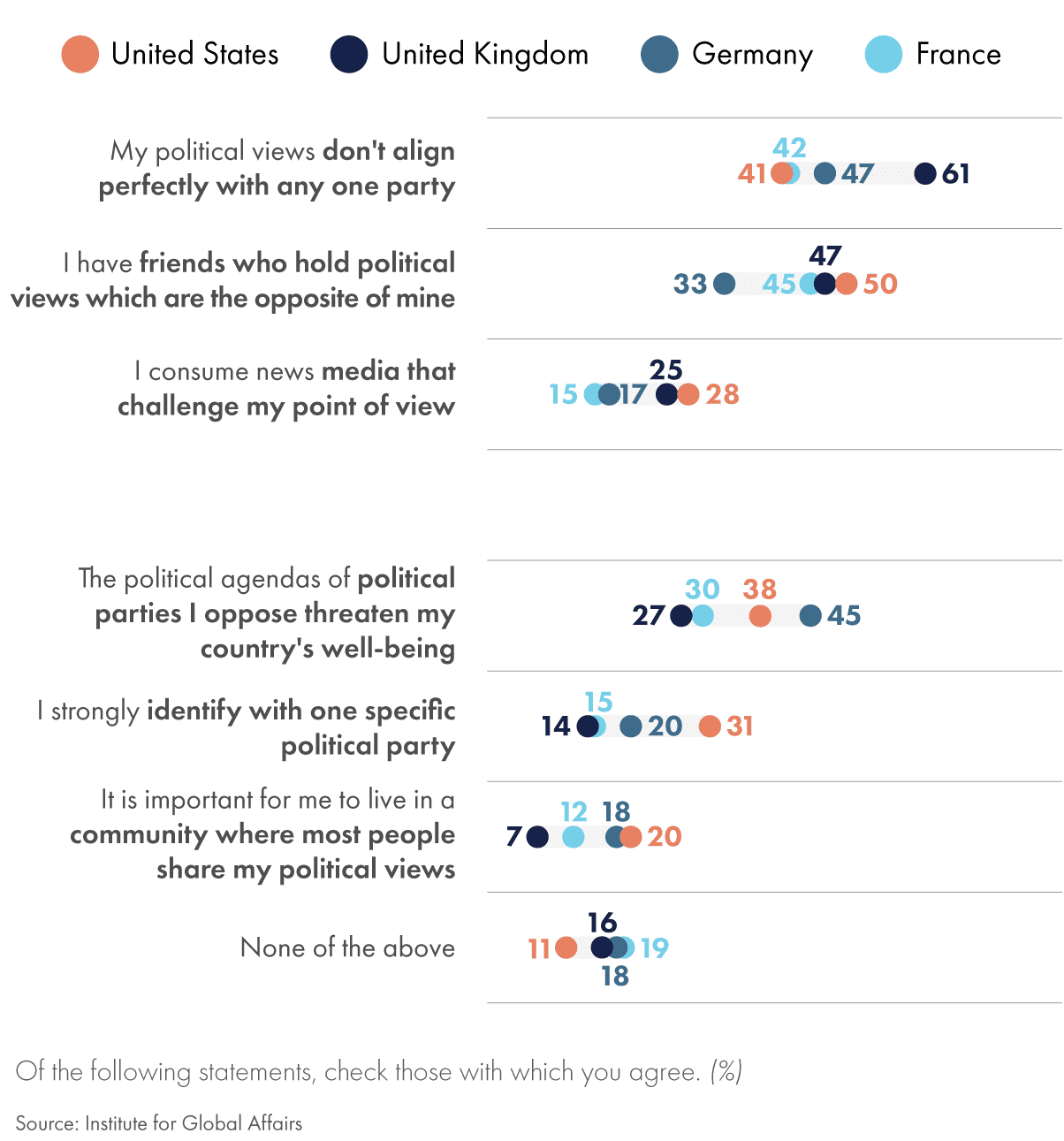
People may agree democracy is the best form of government, but they disagree on how to promote it — and hold different views about what threatens it.
When presented with a series of statements designed to gauge polarization and asked to select as many as they agreed with, about one in four people in the United States and United Kingdom and even fewer in Germany and France report they consume media which challenges their point of view. More than a quarter in each country think the agendas of opposing political parties threaten their country’s well being — a view reported most frequently in Germany. Americans were most likely to strongly identify with one political party at 31%, but that’s still fewer than the 41% who report political views that don’t align with any one party.
Older adults are more likely to have friends with opposite political views, yet also more likely to think opposing political parties threaten their country’s well-being.
Across the four countries surveyed, engagement with different political views varies by age. Older adults report some forms of political diversity more than others. Survey takers over the age of 64 more frequently report having friends with opposite political views than younger adults — nearly half compared with 37% of people under the age of 30. They are also less likely to think it important to live in politically homogenous communities.

However, the older age groups are more likely than younger groups to identify with one political party and to think opposing parties are a threat. And, while no more than a quarter of people in any age group consume media with an opposing perspective — people over the age of 64 are the least likely to do so.
Americans are most opposed to limiting freedom in response to security threats. (The French rank second.)
Striking a balance between the democratic imperatives of individual liberty and due process and the imperatives of national security is difficult in a democracy. But it is more difficult when trust has atrophied, people feel threatened by opposing ideas, and international challenges are cast as existential threats.
In the United States, United Kingdom, Germany, and France, few emphatically support limiting individual freedoms to prevent or respond to security threats. Less than 10% in each country strongly favor it. Views are mixed in the United Kingdom and Germany, however. In both, pluralities somewhat support limiting freedoms — though approximately half are opposed.

In France, 61% either somewhat or strongly oppose limiting individual freedoms. National security concerns have prompted France to pass national security laws — most recently in the run-up to 2024 Summer Olympics in Paris — which critics contend will erode privacy rights.26
The United States has founders who appreciated the tension between security and freedom, and has long prided itself for its protection of individual liberties.27 Yet, recent history provides examples of lawmakers curtailing freedoms in response to security concerns, from the surveillance measures enacted after the terrorist attacks on September 11, 2001 to new legislation seeking to curb foreign-owned social media platforms. A plurality of Americans “strongly oppose” this sort of limitation upon freedoms — more than anywhere else.
Majorities across every age group perceive their country as having become more dangerous rather than safer, though younger adults less so than older adults.
As the United States and Western Europe confront new challenges, the balance between security and freedom could become more difficult to maintain. Most think their countries have become more dangerous over the past decade. This sentiment is most pervasive in Western Europe where heightened fears of terrorism, debates over the ability of these countries to assimilate immigrants, and the Russia–Ukraine war — the largest fought in Europe since World War II — cast a shadow over politics.

In the United States, 31% think their country is safer and 69% think it’s more dangerous. In the United Kingdom, 17% think it’s safer and 82% think it’s more dangerous. In Germany, 15% think it’s safer and 84% think it’s more dangerous. And in France, 14% think it’s safer and 85% think it’s more dangerous.
Across all four countries, adults under the age of 30 are the most likely group to think their country is safer — roughly one-in-three. Even in this age group, however, most do think it’s become more dangerous. Only one in ten survey takers in the oldest group of adults think their country’s safety has improved.
Democracy has come under strain in the United States and Western Europe. Our data give causes for both optimism and critical reflection. Most surveyed are, to varying degrees, confident democracy is the most effective form of government. Yet there is significant concern that the decisions of political elites are harmful, and that immigration poses a challenge to their national identity. A smaller, though sizable number of people worry about polarization and populism. At the same time, one in three people say opposing political parties pose a threat to their country.
Western Europeans, and to a lesser extent Americans, think their country is a more dangerous place today than in the past ten years. A variety of factors could influence these perceptions — and the next sections share detailed views of high-profile conflicts in the Middle East and Europe. But perceptions of internal and external challenges could create policy responses which, however unintentionally, threaten democratic practices. Survey takers hold mixed views on the need to restrict individual freedoms in response to security threats.
Perceptions of the War in Gaza
Half a year into Israel’s war against Hamas, we asked people whether they agreed with certain statements about the war. These statements ranged from the perceived causes and consequences to the preferences for certain outcomes.
Americans, more than Western Europeans, agree with statements supportive of Israel and disagree with statements critical of Israel. Across all four countries, only one in five think their country has responded well or think Western countries must support Israel’s defense.
Americans are the most likely group to think Israel must destroy Hamas in order to be secure or that the West must support Israel’s defense. They’re also the least likely to want Israel to agree to a lasting ceasefire or think its occupation of Gaza and the West Bank is a form of apartheid. This general pro-Israel stance, compared with European publics, reflects their government’s foreign policy.

The United States is Israel’s most generous patron, so it shouldn’t be surprising that the American public might be more likely than Europeans to accept the defense of the country or be less critical about its occupation of Gaza or its prosecution of its war. Still, though Americans were more likely than Western European respondents to think their country responded well to the Israeli-Gaza conflict, only about one in four US respondents held this view.
Younger respondents were most likely to hold views critical of Israel and US support, whereas agreement with the necessity of destroying Hamas and supporting Israel’s defense generally increased with age.
Younger adults are most likely to think Israel’s actions resemble war crimes and that the US is responsible for Palestinian suffering; and they are least likely to think Israel’s security depends on the destruction of Hamas or that the West must support Israel’s defense.

These findings suggest views expressed by student protestors against Israel’s war on Hamas are not an aberration. Rather, they could be seen as part of a broader, intergenerational divergence of opinion over Israel’s conduct of — and America’s responsibility for — the war. Throughout much of the lives of older respondents, support for Israel was seen as a consensus issue throughout the West, and that could be contributing to their relatively greater support for Israel in this conflict.
In the United States, certain views toward the conflict diverge along political lines. Democrats are more than twice as likely as Republicans to think the US shares responsibility for the plight of Palestinians in Gaza (29% vs. 12%, respectively), and more than three times as likely as Republicans to think Israel’s conduct resembles war crimes (34% vs. 10%, respectively).
Most hold Hamas primarily responsible for violence in Gaza, but young adults are more likely to blame either Israel or the United States than Hamas.
Views among young people are critical indeed, which signals how Israel is no longer free from debate or controversy. Nearly as many adults under 30 blame Israel as Hamas for the violence between Israel and Palestinians.
We asked the question in deliberately broad terms, avoiding reference to the Hamas attacks of October 7. It is likely this younger group of respondents took into consideration the political and material conditions of Palestinians living in Gaza before the Hamas attacks. Older respondents, who were nearly three times as likely to hold Hamas responsible than Israel, likely considered the October 7 attacks by Hamas.

European Security: European vs. American Views
The war in Ukraine continues, nearly two and a half years after Russia’s invasion. The four countries we surveyed are among the largest backers of Ukraine.
The US has contributed more military, humanitarian, and financial aid to Ukraine than any other country, and the gap between US and European support only widened with the large aid package signed by President Biden in April 2024. As of May, the US Congress has passed five bills providing aid to Ukraine, totalling $175 billion.28 We asked respondents a battery of questions related to their views of the war in Ukraine and European security more generally.
The first question we asked had to do with prioritizing the goals of “your country” in its response to the war. Advocates for significant support to Ukraine have articulated a number of different reasons, from deterring Russia from attacking its neighbors again to defending democracy itself. This echoes a similar question we asked in our survey of Americans’ foreign policy preferences, published last October, which found avoiding a direct US-Russia conflict and preventing further suffering of Ukrainians as the top two reasons.29 As with that survey, respondents expressed more support for objectives related to avoiding escalation than those — such as deterring autocratic countries from invading democratic ones or restoring Ukraine’s pre-war borders — which are articulated by political leaders.

In responding to Russia’s invasion, avoiding escalation with Russia is a top priority — especially among Europeans. Results suggest transatlantic support for a cautious response.
In responding to Russia’s invasion, avoiding escalation with Russia is a top priority — especially among Europeans. Results suggest transatlantic support for a cautious response.
The fact that Europeans seem more concerned than Americans about escalation should not be surprising. The United States is itself well insulated from the conflict. In fact, the only answer option selected by a majority of respondents was in Germany — most proximate to the conflict and the largest security spender in Europe — where 52% prioritize the need to avoid escalation to a wider regional war. French attitudes toward regional escalation were not so different from the United States, however, and 42% think it should be a primary goal.
While Americans weren’t as concerned as their counterparts in Europe about regional escalation, they shared roughly the same level of desire to avoid direct war between “nuclear-armed powers.” The United States, United Kingdom and France possess their own nuclear weapons while Germany is home to three US nuclear weapons storage sites.
The data reveal people are attentive to the risks of escalation and compassionate toward Ukrainians’ plight, but they are less insistent than their political leaders who assert this war must be fought for the cause of democracy itself or to fully repel Russia to its pre-invasion borders.
People disagree with their political leaders on the wisdom of pushing for a negotiated settlement. The Biden administration has resisted calls to urge Ukraine to negotiate an end to the war that falls short of its objectives. It insists it can’t tell another country what to do without threatening Ukraine’s sovereignty. But when asked whether NATO member countries should encourage Ukraine to negotiate, twice as many people in all four countries responded “yes” than “no.” Fewer than one in five responded that the West should not seek to influence Ukraine in its war.
More support a negotiated settlement to end the war, with a plurality of Americans and Western Europeans citing the loss of life and casualties as a primary reason.
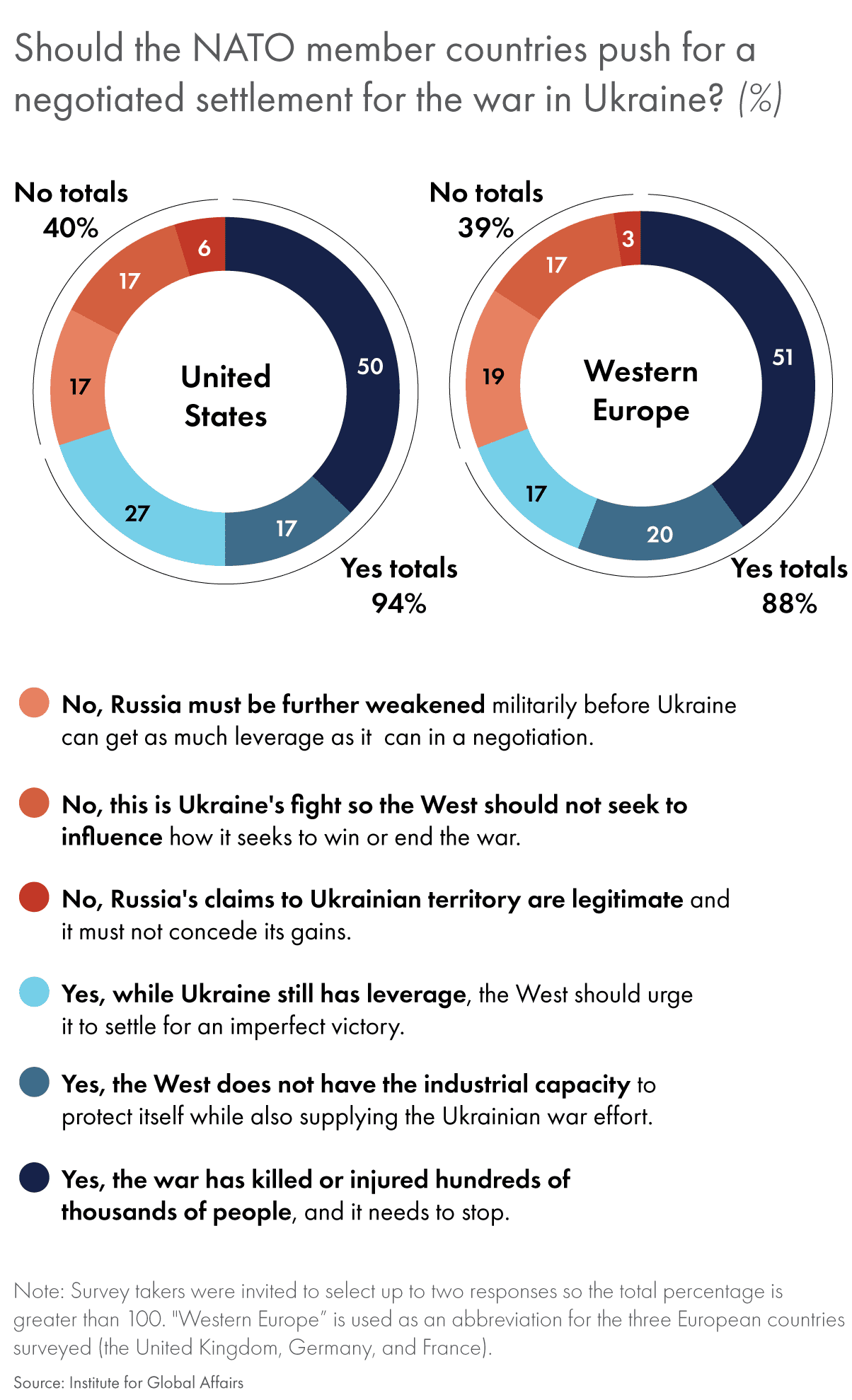
People want Western governments to encourage a negotiated settlement primarily because of the human toll. However, there were some significant differences on each side of the Atlantic. Americans expressed more concern than Europeans that Ukraine might lose leverage over time. Given that the United States has been the primary sponsor of Ukraine’s war effort, the greater concern with Ukraine’s leverage might reflect a worry in the volatility or unpredictability of the outcome of this investment.
Meanwhile, Europeans are more concerned than Americans about the West’s industrial capacity for manufacturing munitions. This seems natural, given that Europe has made fewer investments in its defense industry, and any regional spillover of the war will create more urgency for it to produce munitions faster.
Expression of this concern with Europe’s defense capabilities is found in response to a question about the responsibility for European security. Asked to choose a sentence which came closest to their views about responsibility for European security, Europeans were less likely than Americans to want the United States to remain the primary guarantor of European security. Americans are twice as likely as Europeans to prefer this status quo.
Majorities in all four countries want Europe to be primarily responsible for its own security. Nearly three times as many Western Europeans want a “neutral relationship” with the US as those who want the US to be their primary defender.

The most popular position within each of the four countries surveyed is that Europe should seek to preserve US security guarantees through NATO but otherwise take primary responsibility for its own defense. (This position diverges from the current situation, as illustrated by the relative contributions from the US and European countries to Ukraine’s defense noted above.)
Europeans have begun to debate the ability and desirability of Europe defending itself without, necessarily, assistance from the United States. This idea of “strategic autonomy” has found its largest champion in President Macron of France, and receives the most support from the French public. The British are the least likely to want a neutral relationship with the United States. This makes sense in the historical context of World War II and its close cooperation with the US during its post-9/11 wars.30
Beyond the recognition that the United States and Europe don’t always align perfectly on their security interests, the desire for more European autonomy could come from a perception that the US might not be willing or able to meet its current obligations.
Only 6% of Western Europeans think the US is a “very reliable” guarantor of European security over the next decade. Western Europeans are twice as likely as Americans to think the US is unreliable as a guarantor of European security.
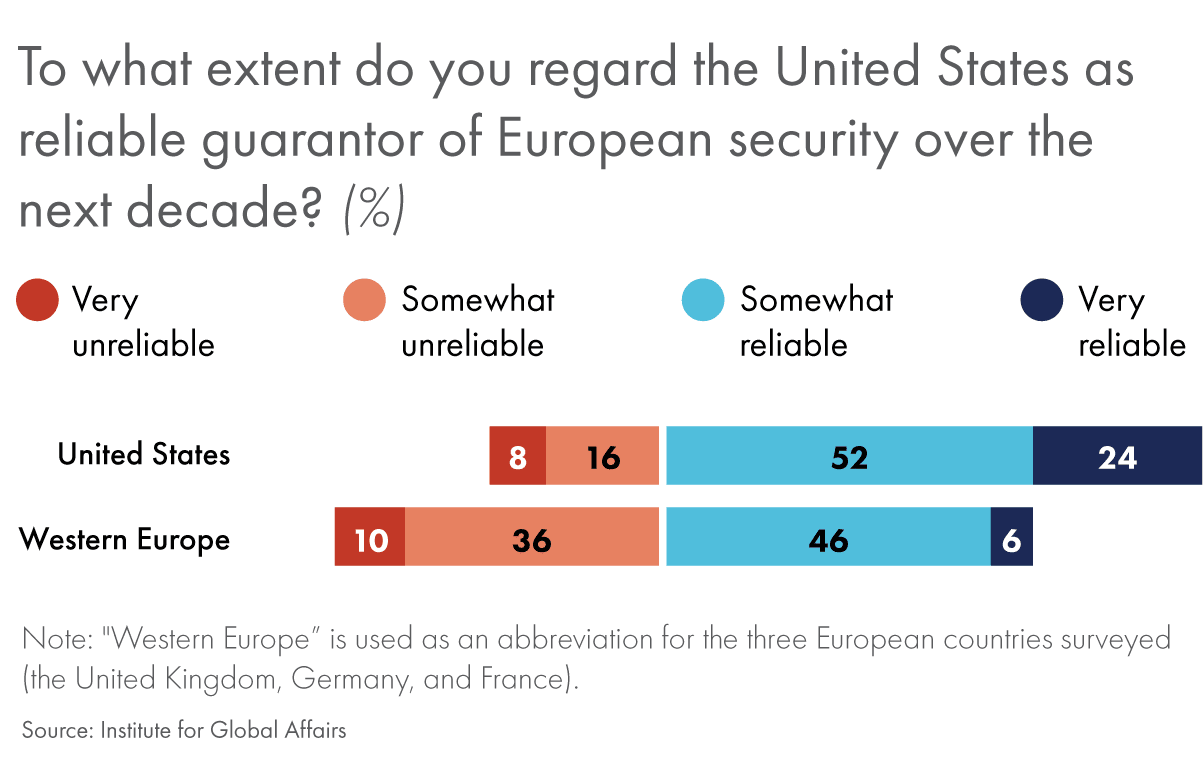
A significant majority in the United States and a small majority in Western Europe believe the US is more reliable than unreliable in its security guarantees for Europe over the next decade. Within the European countries we surveyed, France expressed the most skepticism of US commitments, with half of French respondents deeming the US unreliable (37% “somewhat unreliable” and 13% “very unreliable”). This is consistent with France’s greater preference for a neutral relationship with the United States.
Germany has attitudes similar to the French on the reliability of America’s commitment to Europe. Nearly half of Germans think the United States is unreliable. The British have more positive perceptions among Western Europeans, with about six in ten thinking the United States is reliable. However, people in all three European countries expressed less confidence than Americans.
These results could be fueled by doubts about the future of transatlantic security cooperation under a second Trump presidency. On the campaign trail, President Trump has made comments which likely undermine European confidence in America’s willingness to defend the continent. But it could also be connected to a perception of a longer term decline in America’s status as the sole superpower in a unipolar world.31
A large plurality of Western Europeans think their country should increase military spending. Americans almost evenly split on whether to increase, maintain, or decrease defense spending.
After decades of relative tranquility, Russia’s invasion of Ukraine prompted a renewed appreciation for the exercise of hard power in Europe. Germany underwent what pundits called a “Zeitenwende,” or an epochal shift marking the end of a geopolitical era. Its chancellor, Olaf Scholz, has begun to substantially increase Germany’s defense spending. Germans clearly want him to do more, with a majority calling for more military spending — twice as many want their country to spend “much more” than want it to spend somewhat or much less.
Germans aren’t alone. There is more support for increased military spending than for less. Pooling the data from these three countries, our European respondents were three times more likely to want an increase rather than a decrease in this spending. These findings aren’t surprising because increased spending would be necessary to pursue strategic autonomy, and to become primarily responsible for their own security while preserving the transatlantic alliance.

Respondents in the United States were divided about military spending, with a plurality preferring the status quo. We didn’t offer a “no opinion” or “don’t know” answer option and so the large number of Americans who prefer their country spends “about the same as it currently does” could include many of those respondents who have no opinion. (This would be an example of status quo bias and it would apply to low-knowledge or weak-opinion respondents in all four countries.) Of those Americans seeking a change, about as many want to decrease as increase spending.
Overall, a plurality think the US should maintain troop levels in Europe. There is a much stronger preference for decreasing or withdrawing troops than increasing them.

Though Europeans might want their countries to invest more in their militaries, most aren’t ready to see the US troop presence in Europe diminished or withdrawn. Acknowledging again the possible presence of a status quo bias, the most frequently held view is that the United States should maintain its current troop levels in Europe.
Of those who prefer to see a change in the number of US troops in Europe, Americans are about four times more likely to want the United States to decrease or fully withdraw its troops in Europe than to increase its troop presence there. Europeans, whose security is ostensibly enhanced by the presence of US troops (especially during a land war in Eastern Europe), were two-and-a-half times more likely to want the United States to decrease or withdraw its troops than increase them.
Partner, Competitor, or Rival? Transatlantic Views of China
Presidents Donald Trump and Joe Biden both deem China to be America’s number one foreign policy challenge. Their administrations use different vocabulary to describe this challenge, but both purport economic, security, and technological competition between the two to be inevitable.32 Under Biden, the United States has beefed up its alliances in Asia and pursued similar economic policies as Trump, such as recently proposed tariffs on Chinese-made electric-vehicles, to reduce America’s economic ties with China in core industries.33
European leaders, due to their greater distance from the Pacific and dependence on Chinese trade, are hesitant to view China as a major adversary. The European Union has, instead, taken a multifaceted approach to engage with China as a “partner, competitor, and systemic rival.”34
However, relations have become rockier in recent years. Grievances with China’s unfair trade practices and China’s increased alignment with Russia — to whom it is credibly accused of providing components and equipment with military use — test European unity toward China.35 While Hungary stands out for its recent diplomatic embrace of China and the United Kingdom for its close security partnership with the United States in the Pacific, Germany has taken a more conciliatory approach while France positions itself as an independent military and economic power.36
China is, in general, viewed unfavorably, and Americans are 50% more likely than Western Europeans to hold a “very unfavorable” opinion.
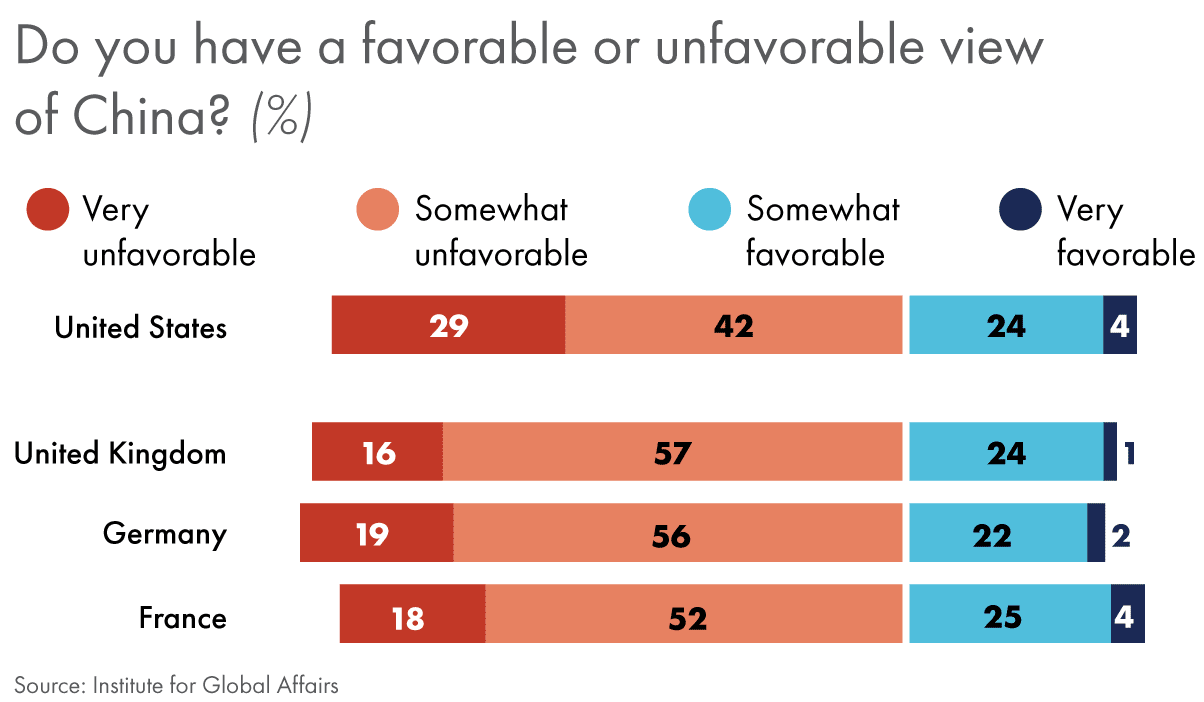
Attitudes in Germany, where the government’s cautious approach seeks to balance its alliance with the United States and its economic interests in China, are the most negative — three in four Germans view China “somewhat” or “very unfavorably.” In France, a country which recently marked 60-years of diplomatic relations with China, 70% view Beijing unfavorably.
Tensions with China are perceived to be greater in the United States. Relations stabilized in 2024 following a spate of crises the previous year.37 But this stability remains tenuous. In Washington, lawmakers of both major parties express anti-China rhetoric and concerns with the expansion of its military. Overall, Americans’ negative attitudes toward China are about as common as those of Western Europeans — but they are more intense: Americans are 50% more likely than Western Europeans overall to have a “very unfavorable” opinion (29% vs. 18%, respectively).
Relations between China and the United Kingdom are also strained. China’s clampdown on Hong Kong, allegations of Chinese cyberattacks on members of parliament, and surveillance and domestic meddling concerns have given many British lawmakers reason to get tough on China.38 Facing pressure from his party to treat China as a threat, Prime Minister Rishi Sunak calls managing relations with Beijing an “epoch-defining and systemic challenge” and groups China as part of an international axis of authoritarians. Nearly three-quarters of Brits view China unfavorably.
Technology, the benefits of trade, and Chinese culture are linked to favorable views of China.
We asked only those respondents who registered a favorable view of China to select from a list of reasons for their positive assessment. Among them, few say it’s because of China’s government, military, or their country’s historical relations with Beijing — though some in France, more than any other country, think China’s military is a source of global stability. Instead, attitudes tend to gravitate towards China’s technological, economic, and cultural pull.

Economically, China is a critical trade partner for both the United States and Western Europe. Despite Washington’s adversarial relationship with China and efforts to reduce trade in critical industries, China is its fourth largest trading partner — and trade between the two continues to increase.39 In Western Europe, Germany is the most reliant on the Chinese market for its exports, which accounts for 3% of Germany’s GDP.40 Among Germans and Americans with favorable views of China, the economic benefits of trade are the most frequently cited reason.
Roughly three in ten Americans and Brits with favorable views are impressed by the Chinese economy and the perception it “ensures equal prosperity for its citizens.” More than half of all respondents attribute their positive views of China to its leadership in technological innovation. It is the most frequently selected reason in the United Kingdom and France.
Chinese culture is the third most frequently selected reason. In the United Kingdom, more than two in five Brits with favorable views of China selected culture as the reason.
Most people who have an unfavorable view of China cite its repressive government and the security threat posed by its technology as reasons. German and French respondents widely cited unfair trade practices.
Similarly, we asked only those who registered unfavorable views to select the reason(s) for their views. Though China’s value as a trading partner contributes to much of its goodwill among Germans with positive views of China, trade is also a driver of unfavorable views. More than half of respondents in Germany and France think China’s trade practices are unfair.
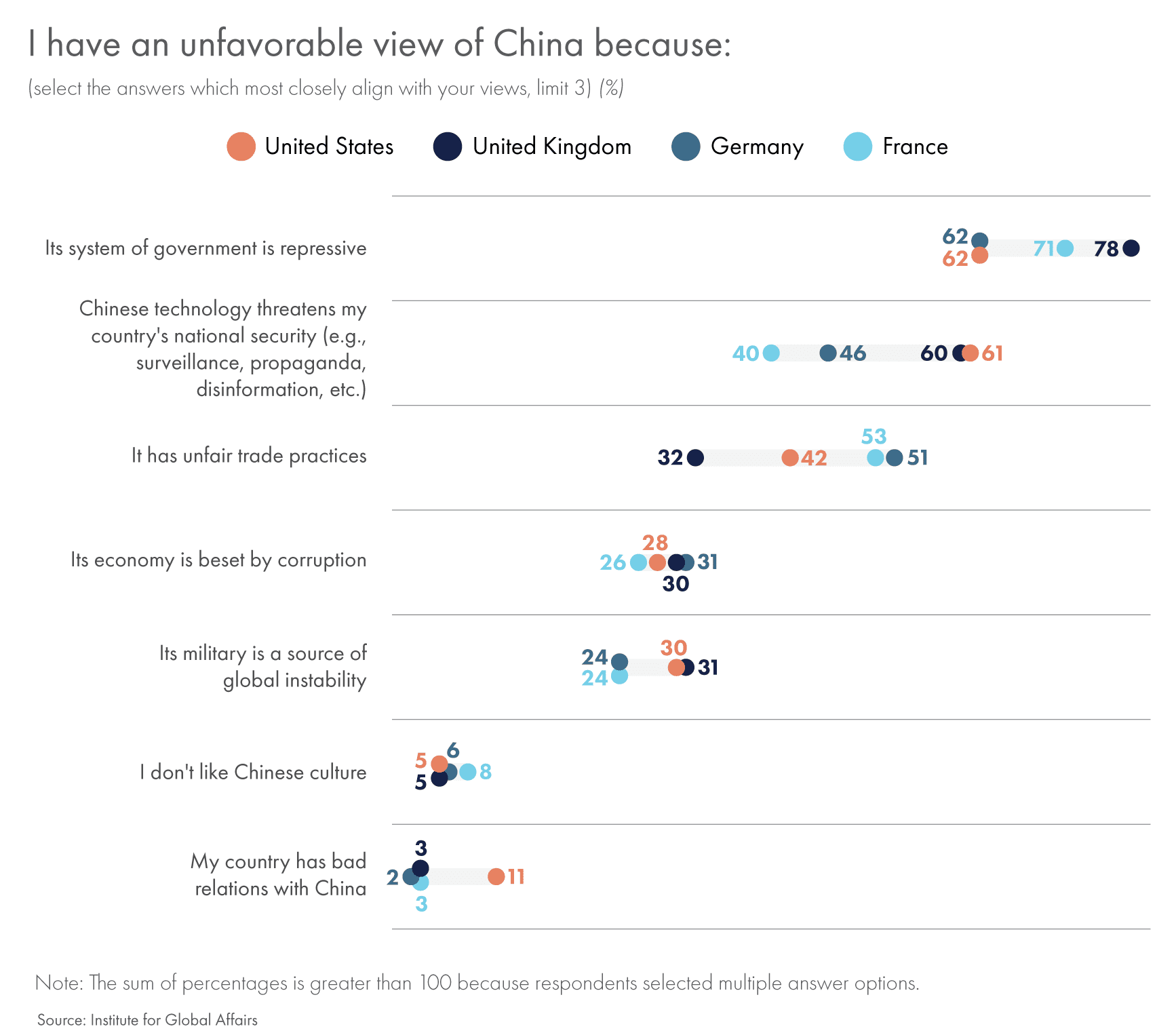
China’s technological leadership is cited as a reason by people with positive views of China and it is also cited as a reason by people with unfavorable views. About three in five respondents with unfavorable views of China from the United States and United Kingdom are concerned with the challenges posed by Chinese technology like surveillance and the dissemination of propaganda and disinformation. Leadership in both these countries have faced recent pressure to restrict or ban Chinese tech companies. London and Washington have effectively blacklisted the telecommunications company, Huawei, citing privacy concerns.41 More recently, the fate of TikTok in the United States and Britain has been the center of public debate.42
The link between the threat of China’s military to unfavorable views is less strong. About half as many Americans and Brits — fewer than a third — cite its destabilizing effects on global security as they do the implications of Chinese tech. Even fewer Germans and French list China’s military.
China’s repressive government is the biggest driver of unfavorable views within each of the four countries surveyed.
Western Europeans are evenly split on whether the West should prepare for a cold war with China. Americans are 60% more likely to answer it should than shouldn’t — and three times more likely than Western Europeans to think China threatens their country’s security.
China’s economic, technological, and military strength leads some analysts and pundits to conclude the United States and its allies are on the precipice of — or already in — a “new Cold War.” When survey takers were asked if their country should prepare for a new Cold War, more Americans than Western Europeans selected yes.
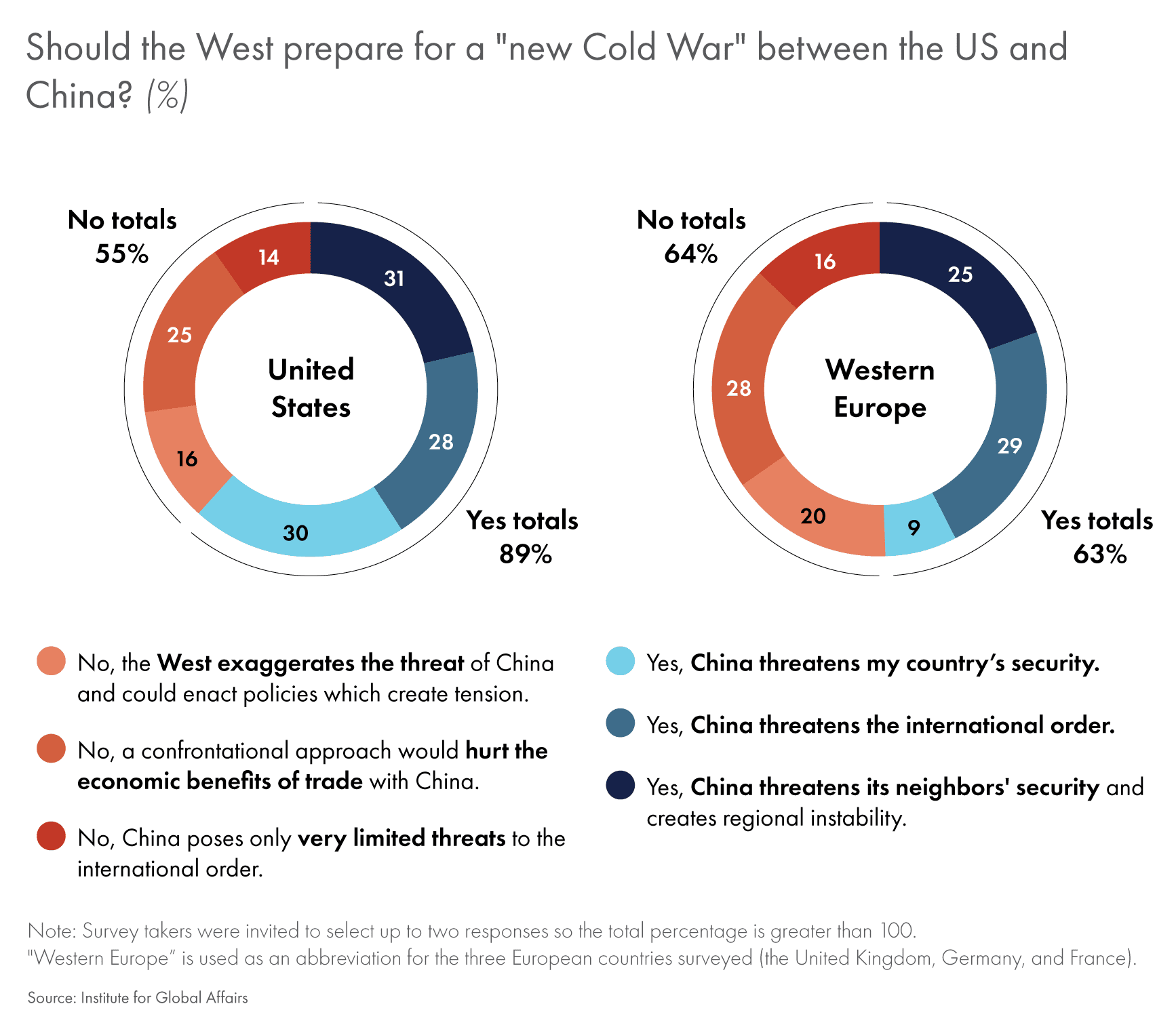
The expansion of Chinese naval capabilities, viewed with trepidation by America’s Pacific allies, has made it more difficult for the United States to operate in the South China Sea and elicits calls for the West to shore up its defenses in the region. French president Emmanuel Macron resists American pressure to pick a side in a conflict over Taiwan.43 Meanwhile, the United Kingdom joined the United States (and Australia) to form a security pact, known as AUKUS, to deepen military collaboration in the Indo-Pacific, and Germany has dispatched naval vessels to the region.44 In our survey, nearly a third of Americans and a quarter of Western Europeans mention China’s threat to its neighbors and its effect on regional instability as a reason to prepare for a Cold War.
The flight of a Chinese spy balloon over the United States in winter 2023 set some lawmakers into a panic.45 But the ability for China’s conventional forces to project power far beyond Beijing’s borders, however, is limited.46 The United States is in range of China’s growing arsenal of long-range nuclear weapons, but Beijing retains a no-first-use policy and is far from possessing a first-strike capability.47 Yet, nearly one in three Americans think China poses a security threat to the United States. This is more than three times the number of Western Europeans who share this fear.
China’s military grows alongside the country’s ambitions on the world stage. China is proactive in international organizations, and positions itself as a leader in international development. Its globe-spanning investments in infrastructure projects is seen as both an opportunity and a danger in Europe and the Global South. Italy, for instance, recently withdrew from the Belt and Road Initiative. These efforts, coupled with fears that China will use its technological prowess to spread its authoritarian model of government, lead Western experts to conclude China holds ambitions to reshape the world order. Roughly as many Americans as Western Europeans — more than a quarter — selected this threat as reason to prepare for military conflict.
Other experts take issue with framing the West’s relations with China as a new Cold War, and caution against preparations for one. Competition with China is wholly different than competition with the Soviet Union, they argue. It’s unclear whether China’s government poses an ideological challenge to the West. Economic interdependence makes confrontation a lose-lose scenario for the United States, China, and Europe. Overall, about one in four Americans and Western Europeans caution against embarking on a new Cold War because it could damage trade.
Younger adults are less likely to see any need to prepare for a “new Cold War,” and almost twice as likely as older adults to think the west exaggerates the China threat.

Young people are more likely to view China more positively than older people. About a third of adults between the ages of 18-29 and 30-44 view China somewhat (32% and 27%, respectively) or very (5% and 4%, respectively) favorably. By contrast, only 18% of those 65 and older have favorable views. Still, most people, regardless of age, have negative perceptions of China.
Most adults under 30 view China negatively, but this doesn’t necessarily mean they want the West to pursue a more confrontational policy. Compared to those over the age of 30, they are less likely to think the West should prepare for a new Cold War, either because China poses a threat to their country, neighbors, or international order. Conversely, they are the group most likely to think the threat of China is exaggerated.
International Challenges
The world today faces a number of significant challenges, from transnational issues like climate change and global pandemics to domestic concerns about terrorism and economic recession. We asked people what they perceive to be the biggest international challenges and who they look to as an example of positive leadership. Americans and Western Europeans agree on much, but diverge in their perceptions of challenges and leadership.
Three-in-four Americans think the United States government sets the most positive example for the world. But very few in Western Europe have this impression — most look toward Western Europe.
Despite growing polarization within the United States,48 a large majority of Americans think the United States sets the most positive example on the global stage. Only one in 20 Western Europeans thinks the United States sets the most positive example for the world.

A plurality in Western Europe selected Germany as the most positive example on the world stage. A majority of Germans and a quarter of French and British respondents picked Germany. Germany’s positive standing in Western Europe may be the legacy of Angela Merkel’s 16-year stewardship of the country as chancellor. During Merkel’s tenure, the United Kingdom withdrew from the European Union (Brexit), and France faced domestic turbulence in the form of far-right populist backlash.
Most think a head of state other than their own sets the most positive example of leadership in the world, though Americans select Biden as the most exemplary leader more than Western Europeans select their countries’ head of state.

Germans’ positive sentiment toward their country does not necessarily extend to their current leader. A third of Germans consider French President Emmanuel Macron to be the head of state who sets the most positive example of leadership for the world, while fewer than one in five chose German Chancellor Olaf Scholz. France lags behind Germany as the country setting the most positive example for the world among Western Europeans, but President Macron is more likely to be selected as setting a positive leadership example.
A plurality of Americans consider President Biden to be the head of state who sets the most positive example of leadership. However, the lack of majority support signifies Americans’ confidence in their government does not extend to their current president. Positive views of President Biden are held by a majority of Democrats (68%) and plurality of Independents (38%). More Republicans chose Israeli prime minister Benjamin Netanyahu as the most exemplary leader (33%) than Biden (22%).
France and Germany — more than the United States and the United Kingdom — think immigration has most affected their countries’ national security in the past 20 years.

A majority of people in France think immigration has most affected their country’s national security in the past 20 years and that the impact has been negative. Germans follow a similar pattern — a plurality think immigration has most affected their country’s national security and a majority thinks that effect has been negative. The 2015 migrant crisis may be a contributing factor as France and Germany accepted the most refugees in Europe, significantly more than the United Kingdom. Since 2015, France has also experienced several high-profile terrorist attacks. Although many of the perpetrators turned out to be European nationals, national security concerns and anti-immigrant sentiment have coincided.
Americans are 70% more likely to see immigration as a positive than negative cultural influence. Immigration is perceived to have a negative impact on national security, especially among Western Europeans.
People in the United Kingdom were most likely to think immigration has most affected their country’s culture in the past 20 years and a plurality think that effect has been positive. A large South Asian presence in the country has left an indelible mark on its culture — chicken tikka masala is widely considered the country’s national dish and Prime Minister Rishi Sunak is a second-generation immigrant. A plurality of Americans similarly consider the effect on culture to be positive, reflecting the self-concept of the United States as a nation of immigrants.
Roughly one in three Americans and Brits think immigration has most affected their country’s economy in the past 20 years. Both countries were about evenly split on whether that effect has been positive or negative. This perhaps points to the politicization of certain narratives about immigrants and job scarcity. Opposition to the free movement of labor within the European Union was a key factor driving Brexit and fears of migrants taking jobs away from American citizens is a regular refrain in US politics.
Germans expressed the most negative sentiment toward immigration’s impact on their country’s culture and national security. This could reflect a backlash against Angela Merkel’s open border policy. Since 2021, Chancellor Scholz has tightened immigration and nationalist parties have gained popularity.49 In neighboring France, far-right nationalists tout the Great Replacement theory that immigrants will replace the white population.50 This could account, in part, for one third of French people thinking immigration over the past 20 years has had a negative cultural impact. Despite this rhetoric, a majority of people in all four countries still think immigration’s impact on culture has been either neutral or positive.

Though a plurality see world politics as a struggle between democratic and authoritarian countries, the majority of people characterize it otherwise.
The struggle between democratic and authoritarian countries emerges as the most frequently held view of the direction of global politics among respondents from all four countries, underscoring a significant concern about the ideological divide shaping global relations. This sentiment is particularly strong among UK respondents, closely followed by the US. A sizable portion of German and French people share this assessment, albeit to a lesser extent. To some extent, this response aligns with expectations, given the historically close relationship between the United States and United Kingdom and the reliance on this narrative as the crux of US foreign policy in the Biden administration. However, this view is only held by a plurality of respondents.
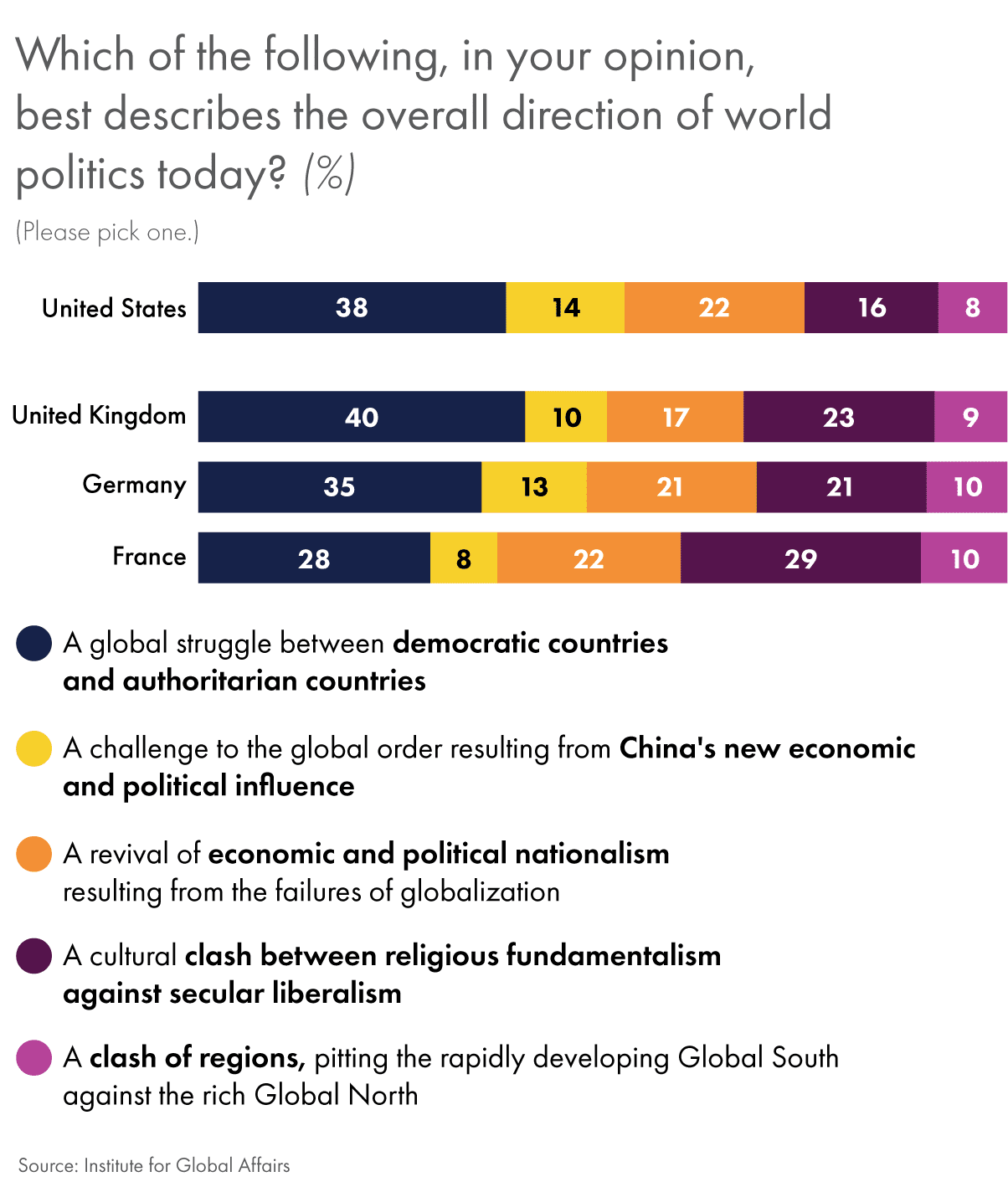
The revival of nationalism due to globalization’s perceived failures was selected by sizable minorities in all four countries. France and the United States ascribe to this perspective most, perhaps reflecting their experience with globalization’s negative impacts or the resurgence of far-right political movements, like the National Rally and MAGA Republicanism, in their domestic politics.
The cultural clash between religious fundamentalism and secular liberalism is seen as the primary driver of geopolitics by nearly a quarter of respondents in the United Kingdom and Germany. In France, nearly a third of respondents identify it as the key global political dynamic. This likely reflects domestic cultural tensions around laïcité and religious expression, such as debates over secularism and immigration from Muslim-majority countries.
Despite the previously mentioned support for preparing for a new Cold War, relatively few regard China’s challenge to the global order as a primary driver of world politics. American respondents show somewhat more concern about China’s influence and France exhibits the least concern. A clash of regions between the Global South and Global North is the least cited perspective across all countries, suggesting that regional disparities are not perceived as the primary tension in world politics.
Most people in every country surveyed consume news of international affairs either daily or weekly, but Germans and Americans consume more.

Half of German respondents report daily engagement with international news — a high level of interest in global affairs. The United States, United Kingdom, and France have lower levels of daily engagement — about a third — with the US slightly higher at 35%. In the United States, weekly engagement is also relatively high at 36%, showing that a significant portion of Americans who regularly follow international news.
France has the highest percentage of respondents who never or almost never follow international news at 13%, possibly indicating either a lack of interest or reliance on other forms of news consumption.
Many view climate change, terrorism, mass migration, and the prospect of nuclear war among the biggest challenges — though notable differences exist between Americans and Western Europeans.
Climate change was selected more than any other issue among Germans and Brits, and second only to terrorism among the French. Yet it didn’t make the top three challenges selected by Americans (though it came in a close fourth place). Economic recession, terrorism, and the possibility of nuclear weapons use were the three most frequently selected challenges by the Americans.

In Germany and France, about two in five people view mass migration as a significant challenge. This could be due to significant influxes of migrants and refugees in recent years. Traditional security concerns also rank highly. More than half in France and two in five Americans are concerned about terrorism. Among the four countries, Germany shows the most concern for the challenge posed by major conventional war, likely influenced by its proximity to the Russia-Ukraine war.
Economic recession is the most cited challenge in the United States. In France and Germany, the prospect of a recession is perceived as substantially less of a challenge. Political polarization is more seen as a challenge in the United States than in any other country.
Younger adults are more likely than older adults to view climate change and economic recession among the biggest challenges. Older adults are more likely than younger adults to think mass migration and terrorism are among the biggest challenges.

Older people express more concern about mass migration than younger respondents. Older people have had more time to witness demographic change. About half of respondents in the 18-29 age group chose climate change as the biggest challenge.
Older respondents express more concern about terrorism. More than a third of adults under the age of 45 express concern about economic recession. People 65 and older are slightly more likely than other age groups to view artificial intelligence as a top challenge.
Methodology & Acknowledgements
This survey was developed and commissioned by the Institute for Global Affairs. The survey instrument was written — and analysis conducted — by Mark Hannah, Lucas Robinson, and Olivia Chilkoti. It was distributed online by YouGov to a sample of 3,360 adults in the United States, United Kingdom, Germany and France — 840 respondents in each country — between April 8 and April 15, 2024.
A nationally representative sample in all four countries were surveyed and statistically significant findings are reported with a margin of error of 1.8%. The survey instrument was translated by YouGov into French for respondents in France and German for respondents in Germany, and survey respondents in those two countries were offered the option to complete the survey in their language or English.
Though this report frequently refers to “Western Europe” as an abbreviation for the three European countries in our sample (the United Kingdom, Germany, and France), and though these three countries have the largest populations and economies in that general region, they are not individually or collectively representative of Western Europe as a region. Moreover, different sources include different countries in the unofficial classification of a Western European region — so any reporting of this data for journalism or academic research should not simply cite “Western Europe” without this context or individual countries listed.
To ensure comparable samples, data analysis uses multi-country weights for four-country analyses and regional weights for analyses which compared the US to the three Western European countries in aggregate. For example, the “Western Europe” percentages include more Germans than French or Brits, because Germany is a more populous country.
To obtain the sample, YouGov used a sample matching approach. YouGov began by enumerating a target population. For the purposes of this survey, the target population is all adults 18 and older in the United States, United Kingdom, Germany, and France. Second, a random sample was drawn from the target population, called the target sample. The target sample is a probability sample and therefore representative of the target population. For every member of the target sample YouGov selected one or more matching members from the pool of online opt-in respondents. This is the matched sample. Matching is done using variables that are available for the target population in high quality probability survey data from the US Census Bureau and the European Commission (which provides current population estimates by age, gender, education, and in the United States, race). The same variables are also available for the opt-in panel.
Using matching, YouGov is able to identify opt-in respondents who are as similar as possible to the selected member of the target sample. The result is a sample of survey respondents who have the same measured characteristics as the target sample. Under certain conditions the matched sample mimics the characteristics of the target sample. This is the most representative of a target population (based on its similarity to the target sample) that online surveys can be without corresponding face-to-face and/or phone surveys.
The matched cases are weighted using propensity scores. Each respondent is assigned a weight based on the likelihood of inclusion in the sample. The propensity score includes a number of variables, including age, education, gender, region, and in the US, race and home ownership. The weights were post-stratified on age, education, gender, region, vote history in the most recent national elections, and in the US, race. Large weights are trimmed and the final weights are normalized to equal sample size.
Response categories for all non-demographic multiple choice questions were randomized. Whenever reference is made in this report to a “significant” or “statistically significant” relationship or difference, significance is established beyond the 0.05 level. Graphics included in the report are summary statistics or cross-tabulations.
s with any opinion survey related to events and policy preferences, the news coverage and public discussion around those events and policies is liable to inform those opinions. For context, the survey was in the field during a period of time (April 8 – 15, 2024) in which Iran launched missile and drone attacks on Israel, China conducted military drills near Taiwan and received Russian Foreign Minister Lavrov as a visitor, and the US military aid package for Ukraine and Israel was being debated but had not yet been signed by President Biden.
IGA thanks Eloise Cassier for her capable assistance with the data analysis. It also thanks Susi Dennison from the European Council on Foreign Relations and Stephen Wertheim from the Carnegie Endowment for International Peace for their review of, and valuable feedback on, a preliminary draft of the survey instrument, as well as Ed King and Tucker Kass from Defense Priorities for their notes on the data. IGA alone takes responsibility for the validity of the survey and this analysis. We welcome any questions about the methodology and data from other researchers: info@instituteforglobalaffairs.org.
About IGA
IGA pursues industry-leading research on geopolitics and global affairs, creates relevant, objective, fact-based content, tools, and programming, and partners around the world to drive awareness, increase understanding, and support action.
Mark Hannah is a senior fellow at IGA, where he leads the Independent America program. He has been a term member of the Council on Foreign Relations and a political partner at the Truman National Security Project. He studied at the University of Pennsylvania (B.A.), Columbia University (M.Sc.), and the University of Southern California (Ph.D.).
Lucas Robinson is a senior research associate and digital media manager at IGA. He studied history at the University of California, Los Angeles (B.A.) and theory and history of international relations at the London School of Economics (M.Sc.).
Olivia Chilkoti is a producer and researcher at IGA. She previously worked at National Public Radio where she covered history and culture. She studied modern European history at the University of Chicago (B.A.).
Endnotes
1. Koh Ewe, “The Ultimate Election Year: All the Elections Around the World in 2024,” TIME, December 28, 2023, https://time.com/6550920/world-elections-2024/.
2. Ishaan Tharoor, “2024 Brings Wave of Elections with Global Democracy on the Ballot,” The Washington Post, January 3, 2024, https://www.washingtonpost.com/world/2024/01/03/2024-elections-us-eu-portugal-austria-bangladesh-india-south-afri-ca-indonesia-mexico-taiwan/.
3. See, for example, Dan Negrea, Joseph Lemoine, and Inacio Campomanes (Eds.), “2024 Atlas: Freedom and Prosperity Around the World,” Freedom and Prosperity Center, Atlantic Council, February 2024, https://www.atlanticcouncil.org/wp-content/uploads/2024/02/2024-Atlas-Freedom-and-prosperity-around-the-world.pdf; Marina Nord, Martin Lundstedt, David Alt-man, Fabio Angiolillo, Cecilia Borella, Tiago Fernandes, Lisa Gastaldi, Ana Good God, Natalia Natsika, and Staffan I. Lindberg, “Democracy Report 2024: Democracy Winning and Losing at the Ballot,” V-Dem Institute, University of Gothenburg, March 2024, https://v-dem.net/documents/44/v-dem_dr2024_highres.pdf; Yana Goroshovskaia and Cathryn Grothe, “Freedom in the World 2024: The Mounting Damage of Flawed Elections and Armed Conflict,” Freedom House, February 2024, https://free-domhouse.org/report/freedom-world/2024/mounting-damage-flawed-elections-and-armed-conflict; “The Global State of Democracy 2023: The New Checks and Balances,” International IDEA, 2023, https://www.idea.int/sites/default/files/2024-02/the-global-state-of-democracy-2023-the-new-checks-and-balances.pdf.
4. “NATO Foreign Ministerial Statement,” Meetings of NATO Ministers of Foreign Affairs, North Atlantic Treaty Organization, March 23-24, 2021, https://www.nato.int/cps/en/natohq/official_texts_182648.htm.
5. Edmund Burke, Reflections on the Revolutions in France (Penguin Classics, 1982).
6. “Doorstep Statement,” Meeting of NATO Ministers of Defense, North Atlantic Treaty Organization, October 11-12, 2023, https://www.nato.int/cps/en/natohq/opinions_219125.htm.
7. Helene Cooper, Julian E. Barnes, Eric Schmitt, Lara Jakes, “As Russia Advances, NATO Considers Sending Trainers Into Ukraine,” The New York Times, May 16, 2024, https://www.nytimes.com/2024/05/16/us/politics/nato-ukraine.html.
8. “Anchored Insight: Admiral James Stavridis on Fiction, History, and Service,” None Of The Above, Institute for Global Affairs, April 2, 2024, https://www.noneoftheabovepodcast.org/episodes/s5ep9.
9. Christopher F. Schuetze, “Russia’s Invasion Prompts Germany to Beef Up Military Funding,” The New York Times, February 27, 2022, https://www.nytimes.com/2022/02/27/world/europe/germany-military-budget-russia-ukraine.html.
10. Isabelle Khurshudyan and Anastacia Galouchka, “Front-line Ukrainian Infantry Units Report Acute Shortage of Soldiers,” The Washington Post, February 8, 2024, https://www.washingtonpost.com/world/2024/02/08/ukraine-soldiers-shortage-infan-try-russia/.
11. Katherine Walla, “Expect a New ‘Bridge’ to NATO Membership for Ukraine at the Washington Summit, Says Julianne Smith,” New Atlanticist, Atlantic Council, April 29, 2024, https://www.atlanticcouncil.org/blogs/new-atlanticist/expect-a-new-bridge-to-nato-membership-for-ukraine-at-the-washington-summit-says-julianne-smith/; Mark Hannah, “The Real Reason Ukraine Isn’t Ready to Join NATO,” POLITICO, September 18, 2023, https://www.politico.com/news/magazine/2023/09/18/nato-democracy-00116350.
12. Matti Puranen, “China’s NATO Anxiety,” The Diplomat, May 15, 2024, https://thediplomat.com/2024/05/chinas-nato-anxiety/; Cindy Yu, “Europe is Torn on China,” Foreign Policy, July 24, 2023, https://foreignpolicy.com/2023/07/24/europe-china-decou-pling-derisking-european-union/.
13. Hans Binnendijk, R.D. Hooker, Jr, and Alexander Vershbow, “NATO Cannot Survive Without America,” Foreign Affairs, May 13, 2024, https://www.foreignaffairs.com/nato-cannot-survive-without-america; Jonathan Swan, Charlie Savage, and Maggie Haberman, “Fears of NATO Withdrawal Rise as Trump Seeks a Return to Power,” The New York Times, December 9, 2023, https://www.nytimes.com/2023/12/09/us/politics/trump-2025-nato.html.
14. Myriam Francois, “How The Far Right Already Won in France,” TIME, April 23, 2022, https://time.com/6170043/french-election-far-right-already-won/; Paul Hockenos, “Germany’s Far-Right AfD Is Worse Than the Rest of Europe’s Populists,” Foreign Policy, February 1, 2024, https://foreignpolicy.com/2024/01/26/afd-germany-far-right-populism-radical-europe-remigration-immigrants/.
15. Francis Fukuyama, “The End of History?” The National Interest, no. 16 (Summer 1989): 3–18, http://www.jstor.org/sta-ble/24027184; Richard Wike and Janell Fetterolf, “Global Public Opinion in an Era of Democratic Anxiety,” Pew Research Center, December 7, 2021, https://www.pewresearch.org/global/2021/12/07/global-public-opinion-in-an-era-of-democratic-anxiety/.
16. Thomas Carothers and Frances Brown, “Democracy Policy Under Biden: Confronting a Changed World,” Carnegie Endowment for International Peace, February 6, 2024, https://carnegieendowment.org/research/2024/02/democracy-policy-under-biden-confronting-a-changed-world; Andrea Kendall-Taylor and David O. Shullman, “How Russia and China Undermine Democracy: Can the West Counter the Threat?” Foreign Affairs, October 12, 2018, https://www.foreignaffairs.com/articles/ china/2018-10-02/how-russia-and-china-undermine-democracy.
17. Moritz Ege and Johannes Springer, The Cultural Politics of Anti-Elitism (London: Routledge eBooks, 2023), https://doi.org/10.4324/9781003141150.
18. “Public Trust in Government: 1958-2023,” Pew Research Center, September 19, 2023, https://www.pewresearch.org/poli- tics/2023/09/19/public-trust-in-government-1958-2023/; Kathryn Olmsted and Simon Willmetts, “State Secrecy Explains the Origins of the ‘Deep State’ Conspiracy Theory,” Scientific American, February 20, 2024, https://www.scientificamerican.com/ article/state-secrecy-explains-the-origins-of-the-deep-state-conspiracy-theory/; Stephen Walt, The Hell of Good Intentions: America’s Foreign Policy Elite and the Decline of US Primacy (New York: Macmillan, 2018); Anna Grzymala-Busse, Didi Kuo, Francis Fukuyama, and Michael McFaul, “Global Populisms and Their Challenges,” Stanford Freeman Spogli Institute for International Studies, March 2020, https://fsi.stanford.edu/publication/global-populisms-and-their-challenges.
19. Ivan Krastev and Mark Leonard, “A Crisis of One’s Own: The Politics of Trauma in Europe’s Election Year,” European Council on Foreign Relations, January 17, 2024, https://ecfr.eu/publication/a-crisis-of-ones-own-the-politics-of-trauma-in-europes-elec-tion-year/.
20. Daniel W. Drezner, “The Realist Tradition in American Public Opinion,” Perspectives on Politics 6, no. 01 (March 2008), https://doi.org/10.1017/s1537592708080067; Ole R. Holsti, Public Opinion and American Foreign Policy (Ann Arbor: The University of Michigan Press, 2004).
21. Mark Hannah, “Worlds Apart: US Foreign Policy and American Public Opinion,” Institute for Global Affairs, November 15, 2018, https://instituteforglobalaffairs.org/2018/11/worlds-apart/.
22. “Acorns Money Matters Report 2024,” Acorns, May 15, 2024, https://www.acorns.com/learn/acorns/money-matters-re- port-2024/.
23. Peter Walker, “Hundreds of Thousands Face Exclusion Over Voter ID Laws, UK Watchdog Says,” The Guardian, September 13, 2023, https://www.theguardian.com/politics/2023/sep/13/uk-election-watchdog-issues-damning-verdict-on-voter-id-im- pact; Catherine Allen, “Map: 29 Million Americans Live Under New Voter ID Laws Put in Place Since 2020,” NBC News, March 12, 2024, https://www.nbcnews.com/politics/2024-election/voter-identification-states-law-map-rcna137555.
24. Richard Wilke, Laura Silver, Janell Fetterolf, Christine Huang, Sarah Austin, Laura Clancy, and Sneha Gubbala, “Social Media Seen as Mostly Good for Democracy Across Many Nations, But US is a Major Outlier,” Pew Research Center, December 6, 2022, https://www.pewresearch.org/global/2022/12/06/satisfaction-with-democracy-and-political-efficacy-in-advanced-economies-2022/; Richard Wike, Janell Fetterolf, Maria Smerkovich, Sarah Austin, Sneha Gubbala, and Jordan Lippert, “Representative Democracy Remains a Popular Ideal, but People Around the World Are Critical of How It’s Working,” Pew Research Center, February 28, 2024, https://www.pewresearch.org/global/2024/02/28/representative-democracy-remains-a-popular-ideal- but-people-around-the-world-are-critical-of-how-its-working/.
25. Zach Hrynowski and Stephanie Marken, “Gen Z Voices Lackluster Trust in Major US Institutions,” Gallup, September 14, 2023, https://news.gallup.com/opinion/gallup/510395/gen-voices-lackluster-trust-major-institutions.aspx; Roberto Foa, “Youth and Satisfaction With Democracy,” Bennett Institute for Public Policy, October 19, 2020, https://www.bennettinstitute.cam.ac.uk/ publications/youth-and-satisfaction-democracy/; Gerardo Berthin, “Why Are Youth Dissatisfied With Democracy?” Freedom House, September 14, 2023, https://freedomhouse.org/article/why-are-youth-dissatisfied-democracy.
26. “France: New Security Law Risks Dystopian Surveillance State,” Press release, Amnesty International, March 3, 2021, https://www.amnesty.org/en/latest/press-release/2021/03/france-new-security-law-risks-dystopian-surveillance-state/; Auriane Dirou, “The French Global Security Law: Security or Liberties?” Just Security, April 15, 2021, https://www.justsecurity. org/75754/the-french-global-security-law-security-or-liberties/; Youcef Bounab, “Lawmakers Approve Bill Allowing French Police to Locate Suspects by Tapping Their Devices,” Associated Press, July 18, 2023, https://apnews.com/article/france-sur- veillance-digital-devices-suspects-6018bdb2aee36ef373209555f5ec0019.
27. Christopher A. Preble, Peace, War, and Liberty: Understanding US Foreign Policy (Washington, DC: Libertarianism.org Press, 2019).
28. “Ukraine Support Tracker,” Kiel Institute for the World Economy, April 25, 2024, https://www.ifw-kiel.de/topics/war-against–ukraine/ukraine-support-tracker/; Jonathan Masters and Will Merrow, “How Much US Aid Is Going to Ukraine?” Council on Foreign Relations, May 9, 2024, https://www.cfr.org/article/how-much-us-aid-going-ukraine.
29. Mark Hannah, Lucas Robinson, and Zuri Linetsky, “Order and Disorder: Views of US Foreign Policy in a Fragmented World,” Institute for Global Affairs, October 11, 2023, https://instituteforglobalaffairs.org/2023/10/vox-populi-order-and-disorder/#full-report.
30. Nicholas John Cull, Selling War: The British Propaganda Campaign Against American “Neutrality” in World War II( New York: Oxford University Press, 1995).
31. “The Crisis of American Power: How Europeans See Biden’s America,” European Council on Foreign Relations, January 2021, https://ecfr.eu/wp-content/uploads/The-crisis-of-American-power-How-Europeans-see-Bidens-America.pdf.
32. Owen Churchill, “Joe Biden Calls China the ‘Most Serious Competitor’ to the US, in First Foreign Policy Speech,” South China Morning Post, February 18, 2021, https://www.scmp.com/news/china/diplomacy/article/3120618/first-foreign-policy-address- president-biden-calls-china-most.
33. David Ferris, Christian Robles, Jack Quinn, and Hannah Northey, “Biden Ratchets up Tariffs on Chinese EVs, Solar, Batteries,” E&E NEWS, May 14, 2024, https://www.eenews.net/articles/biden-ratchets-up-tariffs-on-chinese-evs-solar-batteries/; Jeffrey Kucik and Rajan Menon, “US-China Decoupling: Is It Possible?” Foreign Policy, January 11, 2022, https://foreignpolicy. com/2022/01/11/us-china-economic-decoupling-trump-biden/.
34. Ryan Woo and Ella Cao, “European Commission VP: China is partner, competitor, systemic rival,” Reuters, September 18, 2023, https://www.reuters.com/article/idUSP8N3A402H/.
35. Andrea Shalal, “EU sees signs China supplying dual-use components to Russia, Dombrovskis says,” Reuters, April 18, 2024, https://www.reuters.com/world/eu-sees-signs-china-supplying-dual-use-components-russia-dombrovskis-says-2024-04-18/; Thorsten Benner, “Europe is Disastrously Split on China,” Foreign Policy, April 12, 2023, https://foreignpolicy.com/2023/04/12/europe-china-policy-brussels-macron-xi-jinping-von-der-leyen-sanchez/.
36. James Crabtree, “The Strategic Unseriousness of Olaf Scholz” Foreign Policy, April 22, 2024, https://foreignpolicy.com/2024/04/22/olaf-scholz-germany-china-policy-companies-mercedes-vw-xi-jinping/; Bela Szandelszky, “Hungary and China sign strategic cooperation agreement during visit by Chinese President Xi,” Associated Press, May 9, 2024, https://ap- news.com/article/chinas-xi-welcomed-hungary-talks-orban-0719880a351a5ef0763ae6a623a7798b.
37. Fareed Zakaria, “The US-China Relationship Is Back on Track. Let’s Hope It Stays That Way,” Washington Post, January 27, 2024, https://www.washingtonpost.com/opinions/2024/01/27/us-china-relations-repair-summit/.
38. “Spies, Trade and Tech: China’s Relationship With Britain,” The Economist, May 16, 2024, https://www.economist.com/brit- ain/2024/05/16/spies-trade-and-tech-chinas-relationship-with-britain; Gordon Corera and Damian Grammaticas, “China Poses Threat to UK Way of Life, Says Rishi Sunak,” BBC, September 14, 2023. https://www.bbc.com/news/uk-politics-66810912; Brian Melley, “British Prime Minister Warns of ‘Axis of Authoritarian States’ in Pre-election Speech,” Associated Press, May 13, 2024, https://apnews.com/article/uk-british-sunak-politics-danger-speech-starmer-887bd7c87b12f868b79f42aa6af60a57.
39. Doug Palmer, “What Cold War? US Trade With China Hits New High,” POLITICO, February 7, 2023, https://www.politico.com/ news/2023/02/07/trade-china-relations-economies-0008130; “US-China Trade Relations,” Congressional Research Service, March 28, 2024, https://sgp.fas.org/crs/row/IF11284.pdf.
40. Agathe Demarais, “Why Europe Will Struggle to ‘De-Risk’ From China,” Foreign Policy, September 19, 2023, https://foreignpolicy. com/2023/09/19/europe-eu-china-derisking-decoupling-economy-sanctions-trade-investment-taiwan-geopolitics/.
41. Alexander Smith, “UK Bans China’s Huawei From Its 5G Network After US Pressure,” NBC News, July 14, 2020, https://www. nbcnews.com/news/world/after-months-u-s-pressure-u-k-bans-china-s-n1233752.
42. Vincent Manancourt, “Pressure on UK to Follow US in Toughening Stance on TikTok,” POLITICO, March 18, 2024, https://www.politico.eu/article/uk-tiktok-follow-united-states-toughen-stance/.
43. Benjamin Haddad, “Macron’s Visit: What Do Europeans Really Think About China?” Foreign Policy, April 14, 2023, https://foreign- policy.com/2023/04/14/france-china-taiwan-macron-visit-europe-strategic-autonomy-trade/.
44. Jens Kastner, “As China Flexes Muscle, German Navy Sails to Asia to Reassure Allies,” Nikkei Asia, May 12, 2024, https://asia. nikkei.com/Politics/Defense/As-China-flexes-muscle-German-Navy-sails-to-Asia-to-reassure-allies.
45. Erin Doherty, “GOP lawmakers react to China balloon: ‘This administration lacks urgency,’” Axios, February 5, 2023, https://www. axios.com/2023/02/05/china-balloon.
46. Mike Sweeney, “Challenges to Chinese Blue-Water Operations,” Defense Priorities, April 30, 2024, https://www.defensepriori- ties.org/explainers/challenges-to-chinese-blue-water-operations.
47. James M. Acton, “Don’t Panic About China’s New Nuclear Capabilities,” Washington Post, July 27, 2021, https://www.washing- tonpost.com/politics/2021/06/30/dont-panic-about-chinas-new-nuclear-capabilities/; Tong Zhao, “US-China Arms Control Talks: To Reduce Nuclear Risks, Leaders Should Discuss No First Use,” Foreign Policy, November 6, 2023, https://foreignpolicy. com/2023/11/06/united-states-china-nuclear-meeting-no-first-use-arms-control/; M. Taylor Fravel, Henrik Stålhane Hiim, and Magnus Langset Trøan, “China’s Misunderstood Nuclear Expansion,” Foreign Affairs, November 10, 2023, https://www.foreignaf- fairs.com/china/chinas-misunderstood-nuclear-expansion.
48. “Americans’ Dismal Views of the Nation’s Politics,” Pew Research Center, September 19, 2023, https://www.pewresearch.org/ politics/2023/09/19/americans-dismal-views-of-the-nations-politics/.
49. Sarah Marsh and Andreas Rinke, “Germany’s Scholz, State Leaders Agree on Tougher Migration Policy,” Reuters, November 7, 2023, https://www.reuters.com/world/europe/germanys-scholz-seeks-consensus-migration-stem-far-right-2023-11-06/.
50. Rodney Coates, “What Is the ‘Great Replacement Theory’? A Scholar of Race Relations Explains,” The Conversation, March 15, 2024, https://theconversation.com/what-is-the-great-replacement-theory-a-scholar-of-race-relations-explains-224835.
This post is part of Independent America, a research program led out by Jonathan Guyer, which seeks to explore how US foreign policy could better be tailored to new global realities and to the preferences of American voters.





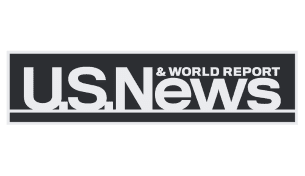



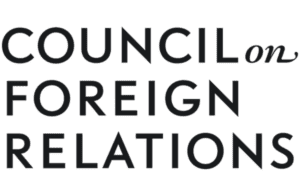




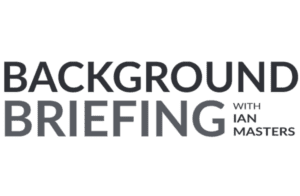





Don’t bring the war on terror to the Western Hemisphere